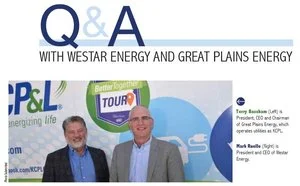Q&A with Westar Energy and Great Plains Energy
Change can be scary, especially with such an important company that calls Topeka home. We asked Mark Ruelle, President and CEO of Westar Energy, and Terry Bassham, President, CEO and Chairman of Great Plains Energy, what this merger means for Westar and Topeka. Q: Why is the merger good for Westar?
Ruelle | Eventually, size and scale matter in our industry. Within Kansas we may seem like a large company, but from an industry perspective, we’re not. Regulations put pressure on costs, then prices. Infrastructure that has been maintained for decades eventually needs to be replaced. Recruiting skilled employees may become harder. And frankly, larger companies might eye you as a piggy bank, which is not the future we wanted.
We needed to grow, and do it on our own terms. A combination with Great Plains provides the size needed for cost efficiencies and spreading investment over a larger customer base. Within about three years, savings from the merger are estimated to be about $200 million. These savings over time flow back to customers when future costs are used to set prices.
Combining with Great Plains offered more than the security of size. Our board selected their offer because it not only benefitted shareholders, but it also reflected common values. We only succeed when our communities are strong and we attract good talent. Great Plains not only said they agreed, but included provisions in the merger agreement to show it. It’s an oldfashioned merger, like marrying your neighbor. We both have served Kansas for more than a century. We co-own three power plants and our employees have collaborated frequently. No other offer came close.
Q: Why is the merger good for Topeka?
Ruelle | Downtown is really starting to take off, and we are among the companies playing a role. Topeka is important to Westar and Great Plains understood that. They’ve committed to keeping a headquarters presence in downtown Topeka, which makes good sense. Once the merger is complete, more than half of their customers will be in Kansas.
Q: How will this affect jobs in Topeka?
Ruelle | Both companies are experiencing record retirements—another fact that supports merging now. The combined company can take advantage of planned retirements and natural attrition as we find the right staffing size without having to depend on laying off people.
Bassham |We don’t know yet exactly how many employees the new company will have or where they will be located. We have teams of employees working to figure out the right structure to meet the needs of our customers. We will have a vibrant Downtown presence.
Q: What do you anticipate will be the biggest challenge?
Bassham |Bringing together two company cultures. We didn’t come into this deal just for poles, wires and power plants. A strong company requires good talent and an adaptable, resilient culture. We have two strong companies. We have a lot of similarities, but processes like this often bring out the differences because that’s what you have to work through. Blending two cultures requires leadership and deliberate work.
Q: How will you approach it?
Bassham |We are using leaders from Westar and Great Plains to integrate our companies rather than leave it to a consultant. Good teams come together and create more energy and value than the sum of their parts. We tell them to think big, to take the best practices from each company and build what our new organization will look like initially. They are also looking at best practices we can grow into together. We have hundreds of employees involved in this process because when you get to build something, you’re more engaged; you better understand a vision you helped create.




